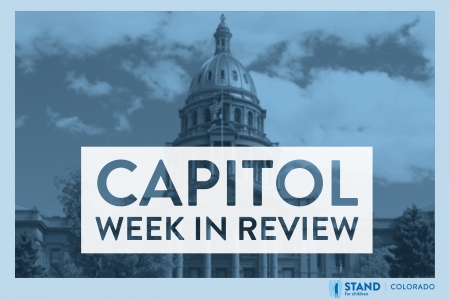Capitol Week in Review brings you news of bills we are tracking around our priorities of advancing educational equity and racial justice in Colorado and making our schools and communities safer and more supportive.
LEGISLATIVE UPDATE
HB23-1001, Expanding Assistance For Educator Programs, which supports student teachers toward the goal of diversifying the teacher workforce, was sent to the Governor for signature.
HB23-1003, School Mental Health Assessment, which creates the sixth through twelfth grade mental health assessment program was passed on third readings by the House.
HB23-1089, Special Education Services For Students In Foster Care, which designates students in out-of-home placements as residents of the school district of their school of origin to increase stability and learning success, passed on third readings out of the House.
HB22-1112, Earned Income And Child Tax Credits, which increases percentages of the federal credit that a resident individual can claim for the child tax credit on their state income tax and requires the Department of Revenue to adjust for inflation, is scheduled to be heard in the House Finance Committee on March 27.
HB23-1151, Clarifications To 48-hour Bond Hearing Requirement, passed unanimously out of the Senate Judiciary Committee. Current law requires an individual who is in jail to be brought before a judge for a bond hearing within 48-hours of arriving at the jail. This bill builds off previous bail reform to further clarify that medical emergencies or addiction treatment is an exception to the 48-hour rule, that the hearing can be held remotely or even through a phone call.
HB23-1169, Limit Arrest For Low-level Offenses, which prohibits a peace officer from arresting a person based solely on the alleged commission of a petty offense, except for high level misdemeanors directly impacting victims (e.g. theft), was rescheduled to be heard by the House Judiciary Committee March 28.
HB23-1235, Technical Modification To Department Of Early Childhood, which makes technical changes HB22-1295, which created Colorado’s universal preschool program, is scheduled to be heard on March 29 in the House Education Committee. This bill would allow the Department of Early Childhood to enter into contracts for early literacy programming and whole-child services, and ensures policy is aligned to current state and federal standards was introduced in the House and assigned to the House Education Committee.
HB23-1241, Task Force To Study K-12 Accountability System, which creates a task force to study academic opportunities, inequities, practices in schools, and improvements to the accountability and accreditation system, is scheduled to be heard on March 29 in the House Education Committee.
HB23-1249, Reduce Justice Involvement for Young Children, was introduced in the House. This bill changes the minimum age – from 10 to 13 – of children who are subject to prosecution in juvenile court; except in the case of homicide.
SB23-039, Reduce Child And Incarcerated Parent Separation, which requires the Department of Human Services to prioritize and facilitate communication and family time between children and their parents who are incarcerated, passed second readings in the Senate.
Our Take
As we shared in last week’s edition of Capitol Week in Review, increasing funding for the Ninth Grade Success Grant program is a top priority of Stand Colorado. 9th grade has come to be well known as the make-or-break year. How well students perform academically in 9th grade can predict their future success. The first year in high school has a huge impact on whether students graduate. In fact, students who end 9th grade on-track are three times more likely to graduate from high school than their off-track peers. (toandthrough.uchicago.edu)
In Colorado, the Center for High School Success (CHSS), a Stand for Children program, partners with four districts who receive funds through the Ninth Grade Success Grant Program. In the 2021-22 school year, On-Track Rates in schools that partner with CHSS in Colorado grew an average of 19 percentage points, drastically increasing the number of students who will graduate in 2025.
It’s clear that implementing a focused 9th grade success is changing the trajectory for Colorado students. By ensuring that students finish their 9th grade year on-track, we ensure students graduate high school prepared for post-secondary success.
Learn more here.
Take Action
The House Appropriations Committee is considering HB23-1231, a bill to support math educators with evidence-based training and interventions to help K- 12th grade students struggling in math. The bill also includes $1.6 million for the Ninth Grade Success Grant program to help ensure that more Colorado students finish their 9th grade year on-track and graduate high school prepared for post-secondary success. Ask the Appropriations Committee to support HB23-1231 with one click!
What We’re Reading














